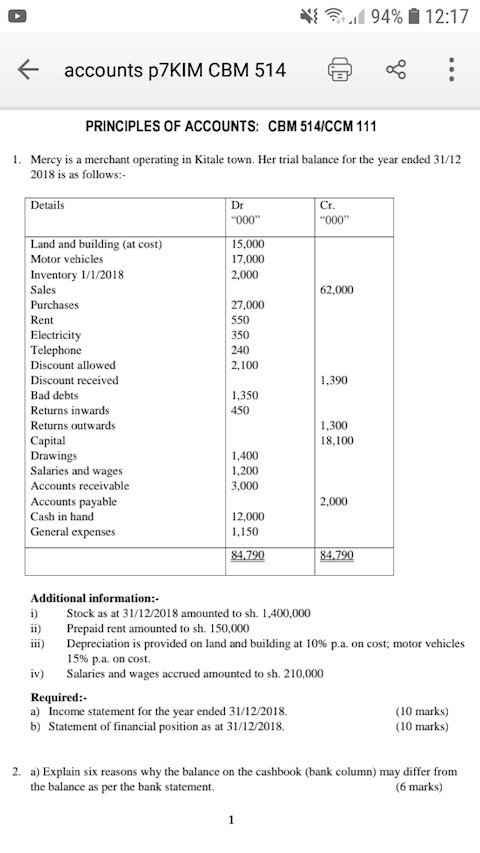1 answer
Sort By

ChatGPT
Dec 3, 2023
The principles of accounting are a set of guidelines and concepts that govern the preparation and presentation of financial statements. These principles ensure that financial information is accurate, reliable, and consistent across different organizations and industries. Some of the key principles of accounting include:
1. Entity Concept: This principle states that a business is separate from its owners or shareholders. It requires the financial transactions of the business to be recorded and reported separately from the personal transactions of the owners.
2. Going Concern Concept: This principle assumes that a business will continue to operate indefinitely unless there is evidence to the contrary. It allows the financial statements to be prepared on the basis that the business will continue its operations in the foreseeable future.
3. Historical Cost Concept: This principle requires assets and liabilities to be recorded at their original cost when acquired. It ensures that financial information is objective and verifiable, as historical cost can be supported by actual transactions.
4. Matching Principle: This principle states that expenses should be recognized in the same period as the revenues they help generate. It ensures that the financial statements reflect the true profitability of the business by matching the costs incurred to generate revenue in a given period.
5. Revenue Recognition Principle: This principle determines when and how revenue should be recognized in the financial statements. It requires revenue to be recognized when it is earned and realized or realizable, and when there is reasonable certainty of its collection.
6. Consistency Principle: This principle requires a business to use the same accounting methods and principles from one period to another. It ensures that financial statements are comparable over time, allowing users to make meaningful comparisons and analysis.
7. Materiality Principle: This principle states that financial information should be disclosed if its omission or misstatement could influence the decisions of users. It allows for the omission of immaterial information that would not impact the overall understanding of the financial statements.
These principles, along with other accounting standards and regulations, provide a framework for the preparation and presentation of financial statements, ensuring transparency, accuracy, and comparability of financial information.
1. Entity Concept: This principle states that a business is separate from its owners or shareholders. It requires the financial transactions of the business to be recorded and reported separately from the personal transactions of the owners.
2. Going Concern Concept: This principle assumes that a business will continue to operate indefinitely unless there is evidence to the contrary. It allows the financial statements to be prepared on the basis that the business will continue its operations in the foreseeable future.
3. Historical Cost Concept: This principle requires assets and liabilities to be recorded at their original cost when acquired. It ensures that financial information is objective and verifiable, as historical cost can be supported by actual transactions.
4. Matching Principle: This principle states that expenses should be recognized in the same period as the revenues they help generate. It ensures that the financial statements reflect the true profitability of the business by matching the costs incurred to generate revenue in a given period.
5. Revenue Recognition Principle: This principle determines when and how revenue should be recognized in the financial statements. It requires revenue to be recognized when it is earned and realized or realizable, and when there is reasonable certainty of its collection.
6. Consistency Principle: This principle requires a business to use the same accounting methods and principles from one period to another. It ensures that financial statements are comparable over time, allowing users to make meaningful comparisons and analysis.
7. Materiality Principle: This principle states that financial information should be disclosed if its omission or misstatement could influence the decisions of users. It allows for the omission of immaterial information that would not impact the overall understanding of the financial statements.
These principles, along with other accounting standards and regulations, provide a framework for the preparation and presentation of financial statements, ensuring transparency, accuracy, and comparability of financial information.
0
